 |
 |
 |
 |
 |
 |
 |
 |
 |
Inter Cities Fairs Cup Third Round First Leg - Elland Road - 34,414
Scorers: Lorimer 65
Leeds United: Sprake, Reaney, Bell, Bremner, Charlton, Hunter, Storrie, Lorimer, Belfitt, Giles, O'Grady
Valencia: Nito, Arnal, Vidagany, Roberto, Mestre, Paquito, Guillot, Palau, Toto, Sanchez-Lage, Munoz
United had earned themselves a reputation for trouble during their rise
to the top of the English game, but in Spain's Valencia they came across
an outfit who could teach them a thing or two. Leeds' first assault on European football had not been without incident
- they had lost skipper Bobby Collins to Poletti's
scything tackle in Turin prior to a functional if colourless disposal
of SC Leipzig. But their opponents in the Fairs Cup third round were their
greatest challenge so far: Valencia had won the trophy in 1962 and 1963,
and had been beaten by Real Zaragoza in the 1964 final - they knew all
about success in European football. The Spaniards needed a play off in their own back yard to beat Hibernian
after finishing level on aggregate in the first round, but there was less
of an issue for them in the second when they easily won both legs against
FC Basle. Leeds were not in the best of states as they approached the game. They
had overcome League leaders Liverpool at Anfield over Christmas, but lost
1-0 at Elland Road to the Reds a day later. Although they had three games
in hand due to postponements caused by a harsh winter, their 2-0 defeat
at Sunderland on 29 January left them in fourth spot, eight points behind
the Merseysiders. Worse still, they didn't have a recognised centre-forward following Alan
Peacock's knee injury in the first half at Sunderland. The luckless Peacock had started the season in fine form, earning an
England recall as the 1966 World Cup beckoned, but he had hit lean times
in recent weeks. The Yorkshire Post's Eric Stanger, in his report
of United's 6-0 FA Cup win against Bury, wrote of the spearhead: 'He could
scarcely put head or foot right and this on a day when all his colleagues
were doing very much as they wished. He is not the same man who began
the season with such zest.' The choice for Leeds manager Don Revie lay between two inexperienced
youngsters, Rodney Johnson and
Rod Belfitt. An obvious move would
have been to switch Jim Storrie into
his old No 9 role, but he had been playing well on the wide right and
was only just recovered from injury himself. In his desperation, Revie
considered picking either Billy Bremner or Willie
Bell up front, but feared the disruption either change would cause. In the end, he opted for Belfitt in a side that had otherwise become
recognised as his first choice since Bobby
Collins' injury. Jack Charlton, acting as captain in the absence of
the Scot, missed the defeat at Sunderland with a neck ricked in training,
but returned for the Valencia game. The Spaniards went into the contest with their own injury worries as
noted by coach Sabino Barinaga, inside-forward with mighty Real Madrid
for a decade and scorer in 1947 of the first ever goal at the Bernabeu
Stadium: 'We have had no fewer than seven players hurt in the last fortnight.
I have two good reserves to put in for Zamora and Waldo.' Goalkeeper Zamora
was the son of the famous Spanish international goalkeeper of the 1930s,
while regular centre-forward Waldo was a Brazilian and Valencia's star
turn. Barinaga delayed his selection, saying, 'It will depend on the state
of the ground. If you like to play good football, the ground should be
dry with plenty of grass.' The coach feared the bare Elland Road pitch,
which had given Leeds a key advantage in their earlier ties, forcing skilled
opponents to struggle in alien conditions. In stark contrast, Don Revie
described the surface as 'perfect'. The Leeds manager knew he would face a battle, but could hardly have
anticipated the full ferocity of the encounter. Leeds dominated affairs for most of the first half, but struggled to
find their normal high tempo rhythm. Valencia were a knowing and cynical
force, employing possession football, close marking, spoiling tactics
and heavy tackling to disrupt United's play. They looked every inch the
class act they were. According to The Times: 'The Spaniards, with
Guillot and Lage flitting around smoothly, had shown they were the better
equipped technically on the night. Leeds, for their part, quickly betrayed
their eagerness, coherence was absent and distribution unconsidered, and
the maladies were undiminished as the first half progressed.' United, with young Belfitt looking out of his depth against such wily
opponents, struggled to make headway. They had most of the possession
but failed to carve out a clear cut opening: Giles' free kick went narrowly
wide; then the Irishman hurried a shot with the Spanish defence for once
looking uncertain; and Nito blocked Lorimer's shot at short range, but
that was about it. Valencia were far less wasteful and took the lead after 16 minutes following
a defensive misunderstanding. Leeds were caught short at the back following
a full-blooded attack, and Hunter and Reaney each left things to the The goal, very much against the run of play, both disheartened Leeds
and provided comfort for the Spaniards. More than content with a 1-0 lead,
they pulled everyone back, allowing United's frenetic assaults to crash
against a wall of red shirts, packed in and around their own penalty area. Refereeing the game was Leo Horn, a renowned Dutch official, who had
handled more than 100 internationals, including Hungary's famous 6-3 shaming
of England at Wembley in 1953, plus a couple of European Cup finals. For
all his experience, though, Horn seemed singularly reluctant to take any
firm action on the night, offering the Spaniards enormous latitude. They
were determined not to lose a goal and fiercely exploited Horn's tolerance.
The Times: 'There was a hint of things to come when Mr Horn called
up Roberto, the Valencia captain, after Mestre had made one scything late
tackle on Bremner, very much a target for the Spaniards. What the referee
said to Roberto made little difference. Valencia still piled in, and Leeds
were not slow to respond.' Phil Brown in the Yorkshire Evening Post: 'Mr Horn should have
sensed the lava flow in this game in the first minute when Hunter swept
Lage off his feet and Lage looked daggers at Hunter. Mr Horn gave verbal
rebuke, appealed to the captains, Charlton and Roberto, but he should
have laid down an ultimatum by quarter time, and started booking. 'That does not excuse the players for a moment for playing the game in
the wrong spirit. Billy Bremner, hunted and fouled with sickening consistency,
kept his head magnificently against an evil barrage of tackles, and played
his football to the end. He deserves very great praise indeed.' Eric Stanger: 'If Mr Horn had been firmer from the beginning the match
might not have developed as it did. Leeds are no angels when it comes
to rough house, but Valencia's tactics in the Fairs Cup-tie smacked more
of the bullring than the football field. They were the roughest Continental
side I have ever seen. 'They never hesitated to bring down the man when they could not get the
ball, and they had no need to resort to such tactics, for in the few flashes
of football there were they seemed themselves to be a clever, resourceful
side built round Mestre, the centre-half, Roberto, the left-half and captain,
and Sanchez-Lage. 'Leeds were never afraid to give as good as they got, but they would
have done better not to have tried to mix it quite so much … for Valencia
were just as strong as they were and knew every trick in the book.' After such a fierce first half, the game restarted quite peacefully after
the break and O'Grady's deep centre nearly caught Nito out before it drifted
wide. Things soon heated up again, though, as full-back Vidagany flattened
Billy Bremner when he tried to make space on the right. The referee beckoned
the Valencia captain for another warning, but took no further action. Valencia were now The Times: "Leeds had been pounding away at Valencia's mobile wall of
defenders from the outset of the second half; they desperately needed
a steadying influence to harness and channel their drive but what they
lacked in imaginative ideas, they substituted with spirit and the Spaniards
were seemingly content to contain them. The manner in which they sometimes
did so certainly incurred the displeasure of the Leeds fans. "All the shafts, at this stage, were aimed at Leeds: O'Grady's centre
eluded Nito and passed wide; Lorimer flung himself at Bremner's centre
for the goalkeeper to save; and Storrie's header was, in turn, cleared
off the line. "Yet still Leeds hardly suggested they knew how to open up the Valencia
defence which, at times, funnelled as many as nine red shirts into the
goal area. One had almost begun to despair that the curtain could be pierced
when Leeds equalised, Lorimer driving home a cross from Giles. It was
certainly reward for the pressure they had brought to bear." Back on level terms, United took fresh heart and pressed for a second
goal that continued to elude them. Jack Charlton: 'What had been a sizzling atmosphere became downright
white hot, as we threw everything into an assault which, we hoped, would
bring us a winner. Fifteen minutes to go, and I raced upfield to add my
weight to one of our attacks. As I challenged an opponent in the Valencia
penalty area, I was kicked. This angered me, of course - but before I
knew where I was I found myself having to take much more … for one of
my opponents slung a punch which would have done credit to Cassius Clay. 'Right there and then my anger boiled over … I chased around that penalty
area, intent upon only one thing - getting my own back. I had completely
lost control of myself, after these diabolical fouls upon me, and neither
the Spaniards nor the restraining hands of my team mates could prevent
my pursuit for vengeance. Suddenly players seemed to be pushing and jostling
each other everywhere. Police appeared on the field to stop this game
of football from degenerating into a running battle. And Leo Horn walked
off with his linesmen, signalling to club officials of both teams to get
their players off, too. Billy Bremner: 'When we were ready to return, we got the word that Big
Jack could stay where he was - he'd been sent off, we were informed, and
so had a Valencia man. We all assumed it was the No 5, who had started
the trouble which so enraged Big Jack. But when we returned to the pitch,
there was No 5, as large as life. The man who was sent off was the left-back,
and I reckon that it could be coincidence, but he had been pointed out
by team mates as being the player involved in the first place, and it
so happened that he had been given a right roasting by Jim Storrie, who
had been having a blinder on the right wing. Certainly the Spaniards risked
very little by losing their left-back. Whichever way it was, this case
of mistaken identity was a good thing for them.' The conflict did not end there. Seven minutes from time Valencia inside-forward
Sanchez-Lage felled Jim Storrie and was promptly dismissed. That finally
calmed the atmosphere. In the last quarter of an hour of the battle, either side might have
gained a precious lead with Sprake having to stretch to tip Guillot's
header over the bar and Bremner missing narrowly with a header at the
death. In the end, though, the 1-1 draw was just about right. Despite
all the furore and antics, United and Valencia had proven themselves well-matched
and worthy opponents. They came with wildly different backgrounds and
approaches to the game, but it was the devil's own job to separate the
two sides. The Spaniards had settled for a containing, niggling performance,
putting their more expansive game aside for the night, while Leeds demonstrated
once again their unquenchable spirit. The controversy rumbled on after the final whistle. Leo Horn offered
some inflammatory comments, claiming that Leeds were on a £1,500 bonus
to win: 'Money was the cause of the trouble … you could 'I was reminded of South American cup finals I have taken, where players
were on a bonus of 3,000 dollars. It was the same then. Since European
football began we have seen this sort of thing spreading. These games
have become too important for the players. When Leeds lost a goal this
nervousness spread among them. Valencia had nine men in front of their
goal. They, too, were gripped by this terrible feeling. I understand professional
players, but they have changed. Money has made them too eager. After sixteen
years of international refereeing I believe money causes all the trouble
… all the nervousness and desperate play. It is no use clubs expecting
referees to impose discipline. The referee is there to control a match.
Players must be taught to control themselves. 'I have always regarded Charlton as a fine man. He was the cleanest player
on the field, until he lost all control. I saw a Spanish defender kick
him, and if Charlton had given a reprisal kick, I could have understood
it and let it pass, because it happens so often. As captain of Leeds,
and an international, he should have been the first player to exercise
complete self control.' Horn also accused Don Revie of asking him to let Charlton off, saying,
'Do you know what you are doing? This is an international.' Horn replied: 'Do you think this is the first time I have refereed a
game? I don't care if Charlton is an emperor, he is not coming back on
the field tonight.' Don Revie said later: 'It's untrue. My players were on no special bonus.
Mr Horn is guessing, or has been misinformed. I resent these allegations,
but I am saying no more now. It's time for the whole thing to simmer down.' The papers inevitably focused on the less savoury side of the contest
and there were calls for United to be thrown out of the competition and
Charlton to face a lengthy ban, despite them being the wronged party for
once. The Fairs Cup Committee, in a level headed moment of reason, decided
to delay their response to the affair, choosing to meet the day after
the decisive second leg. They made sure it was public knowledge that they
would have observers present for the return in Valencia and that behaviour
there would colour their final judgement. They had already banned Roma
for three years after crowd trouble when they hosted Chelsea earlier in
the competition, so were known to be ready to impose the strictest of
sanctions. Leo Horn faced intense criticism for his part in affairs. He had been
hopeful of being selected to referee the forthcoming From the very start Huber punished the slightest indiscretion and his
fussy approach worked well, though fears of the penalty if there was a
repeat of the Elland Road brawl clearly had its impact on the players. United set their defensive stall out in sweltering conditions, June-like
in February, and gave one of their stereotypical stonewall performances
with Jack Charlton in the thick of things. They were content to play on
the counter and 15 minutes from the end took the lead from just such a
break. Madeley, nominally centre-forward but filling a holding role in
midfield, put O'Grady free on the
edge of the penalty area with a 30-yard pass over the full-back. The Spanish
defence clearly thought he was offside and pulled up, allowing the winger
to pick his spot and fire a low cross shot into the net. It was Valencia's turn to be incensed. Phil Brown: 'The linesman and referee refused the appeal, but goalkeeper
Nito and left-back Toto were not content. They hotly harangued the linesman
for not flagging and pulled his flag out of his hand in a push about -
I think they were trying to show him how to wave the flag.' Nito had made little attempt to save the shot and expended his energy
instead in manhandling the linesman. His colleagues mobbed Mr Huber, who
was eventually persuaded to consult his colleague. It made little difference,
though, and the goal stood. There were scares after that for Leeds, but they hung on grimly for the
1-0 win that secured passage into the last eight. Choosing to ignore the flare up after the goal, the Fairs Cup Committee
sanguinely decided to take no disciplinary action, with Sir Stanley Rous
noting, 'The match last night was a model of good football. As far as
the Fairs Cup is concerned, both clubs have exonerated themselves. If
either qualify again, they will be welcome.' Jack Charlton was fined £50, with £30 costs, at an FA disciplinary hearing
two months later but none of the Spanish players ever suffered any sanction. After the game, Don Revie focused on praising his men and the quality
of their performance: 'It was so superbly forged by a side of youngsters.
I think they played better than they did even at Chelsea (in the FA Cup
the previous weekend, when they had been held at bay by a wonder performance
on the part of Blues keeper Peter Bonetti), and I am fast coming to the
conclusion that there is just no end to their courage and fighting spirit.
They were magnificent against a highly experienced club.'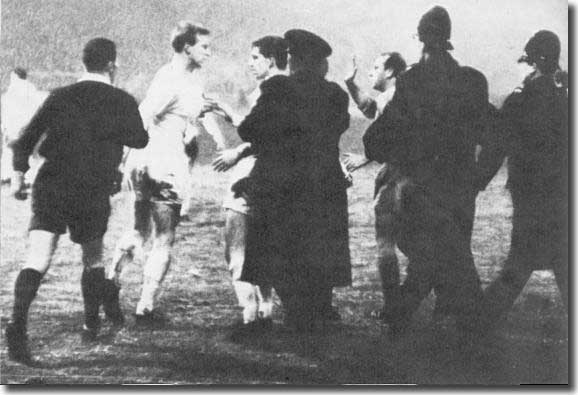 Jack
Charlton: 'One of the greatest storms in European football burst about
the heads of Leeds United when they played Valencia in the Inter Cities
Fairs Cup on 2 February, 1966. I was in the centre of the row - three
players, including myself, were ordered off; both teams were also summoned
from the field for a spell to allow heated tempers to cool; and when it
was all over, Dutch referee Leo Horn claimed: "Money was the cause
of the trouble. You could almost smell it on the pitch." Such was
the chaos and such was the anger that, at the time, our manager, Don
Revie, said: "If this is European football I think we are better
out of it."'
Jack
Charlton: 'One of the greatest storms in European football burst about
the heads of Leeds United when they played Valencia in the Inter Cities
Fairs Cup on 2 February, 1966. I was in the centre of the row - three
players, including myself, were ordered off; both teams were also summoned
from the field for a spell to allow heated tempers to cool; and when it
was all over, Dutch referee Leo Horn claimed: "Money was the cause
of the trouble. You could almost smell it on the pitch." Such was
the chaos and such was the anger that, at the time, our manager, Don
Revie, said: "If this is European football I think we are better
out of it."'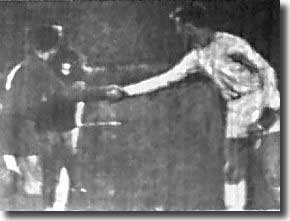 other
when a speculative long ball dropped into their half. There was no such
hesitation from left winger Munoz and he was on the ball in a flash, rounding
Sprake with a deft swerve to slip the ball home.
other
when a speculative long ball dropped into their half. There was no such
hesitation from left winger Munoz and he was on the ball in a flash, rounding
Sprake with a deft swerve to slip the ball home.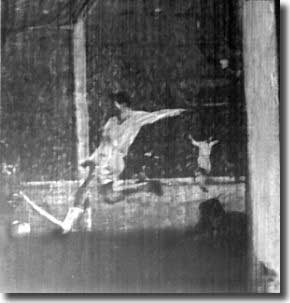 defending in depth as United developed some real momentum. The Whites
had raised their game after the break, moving the ball with accuracy and
speed, now wisely exploiting the space on the flanks to avoid the choking
midfield morass.
defending in depth as United developed some real momentum. The Whites
had raised their game after the break, moving the ball with accuracy and
speed, now wisely exploiting the space on the flanks to avoid the choking
midfield morass.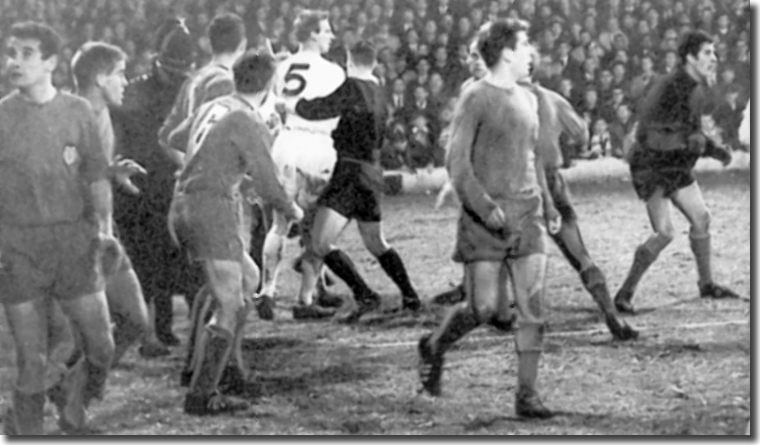 'I
was still breathing fire when I reached the dressing room - then I got
the word that I need not go back. For a moment I thought the referee had
called off the match … then it sank home that it was only Jackie Charlton's
presence which was not required any longer. For eleven minutes the teams
remained off the field, to allow tempers on both sides to cool down. By
that time, I was beginning to feel sorry for myself, and not a little
ashamed of the way I had lost my temper. The only consolation I had was
that a Valencia man - left-back Vidagany - had been told he need not return
to the fray, either. So it was ten against ten.'
'I
was still breathing fire when I reached the dressing room - then I got
the word that I need not go back. For a moment I thought the referee had
called off the match … then it sank home that it was only Jackie Charlton's
presence which was not required any longer. For eleven minutes the teams
remained off the field, to allow tempers on both sides to cool down. By
that time, I was beginning to feel sorry for myself, and not a little
ashamed of the way I had lost my temper. The only consolation I had was
that a Valencia man - left-back Vidagany - had been told he need not return
to the fray, either. So it was ten against ten.'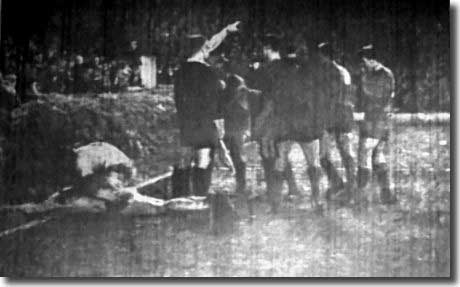 see
it in the nervousness and the excitement of the players. There was something
in the air … something unpleasant … there was too much at stake. It was
unbelievable.
see
it in the nervousness and the excitement of the players. There was something
in the air … something unpleasant … there was too much at stake. It was
unbelievable.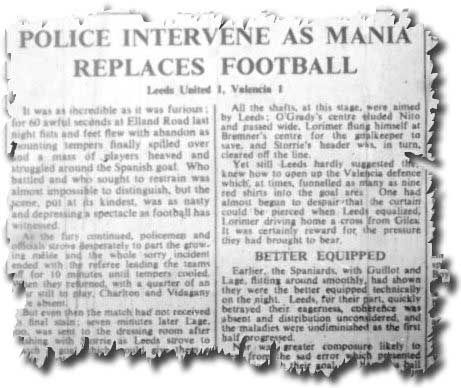 World
Cup final, but now kissed goodbye to that particular opportunity. He was
replaced for the second leg, a fortnight later, by Othmar Huber of Switzerland.
World
Cup final, but now kissed goodbye to that particular opportunity. He was
replaced for the second leg, a fortnight later, by Othmar Huber of Switzerland.